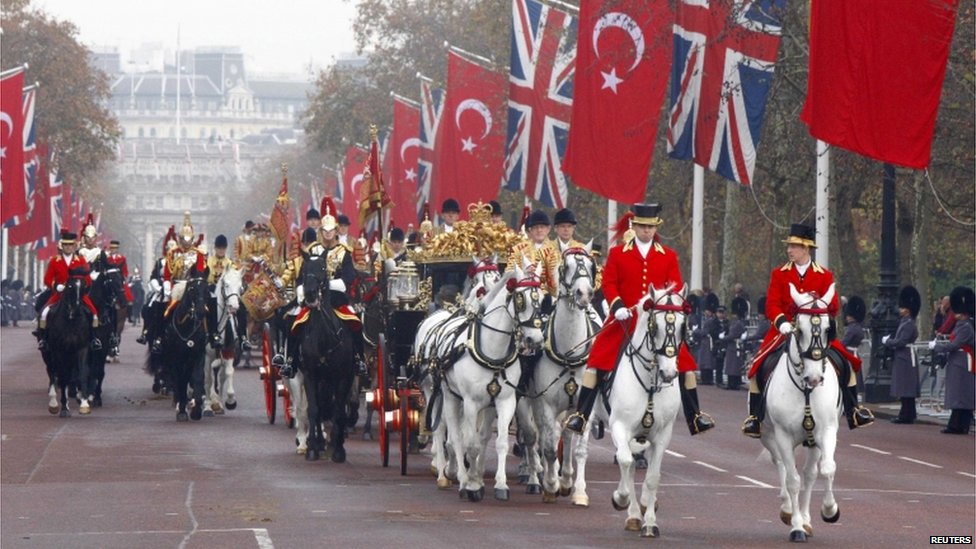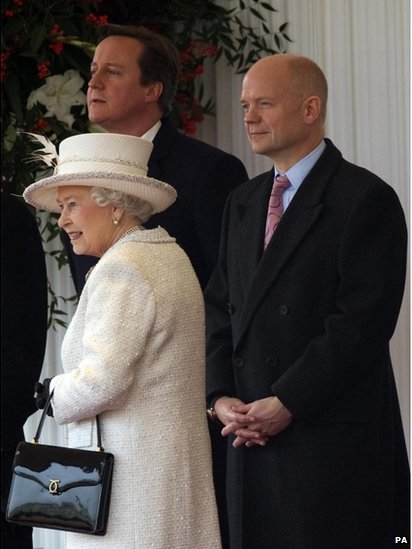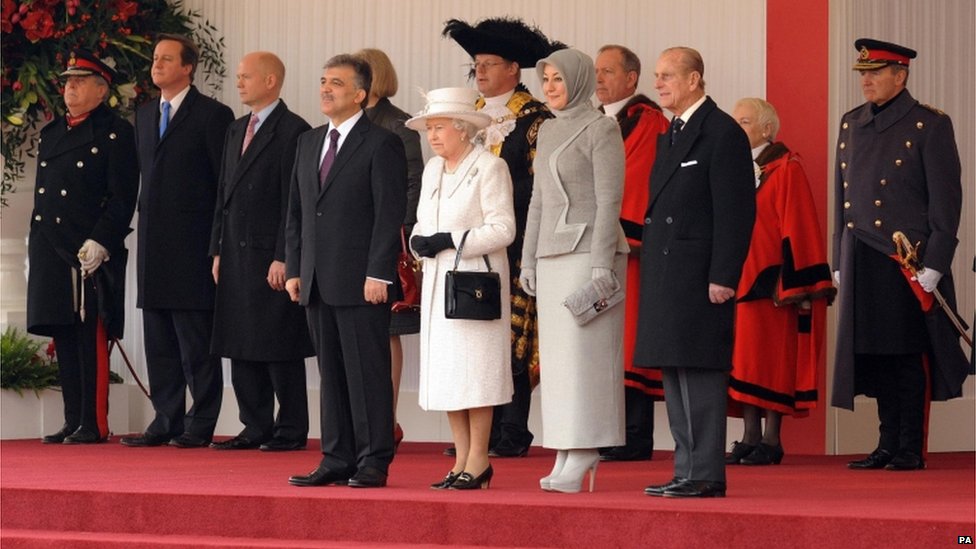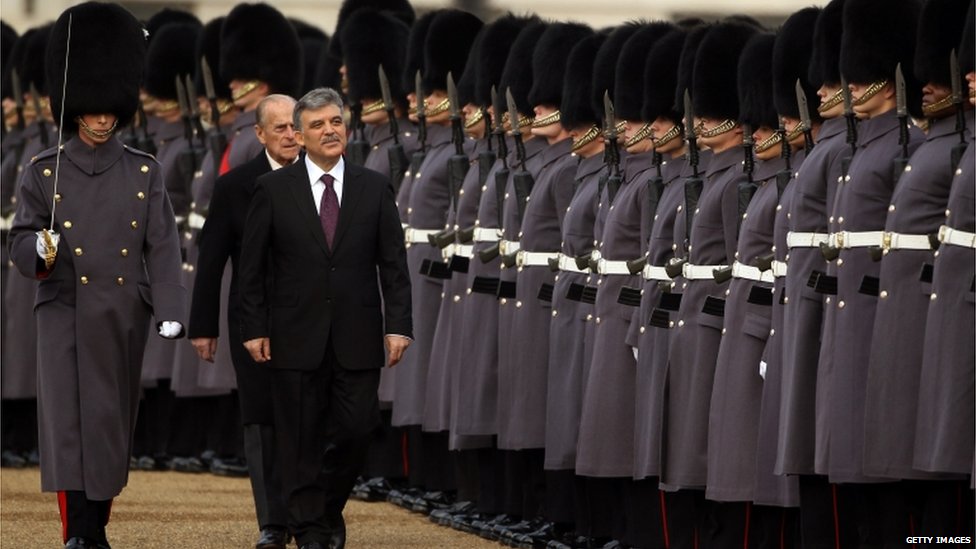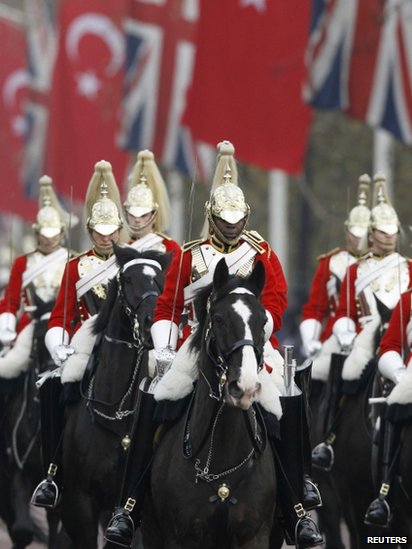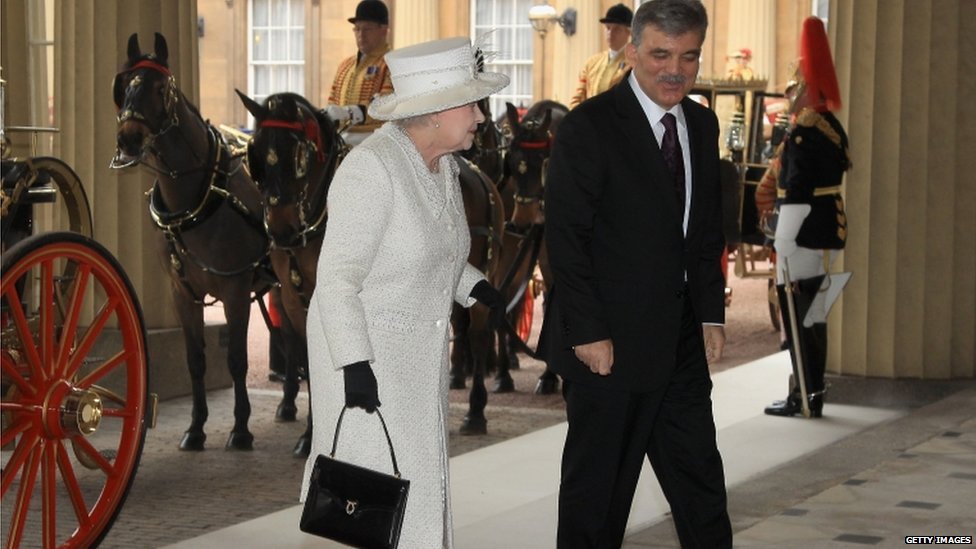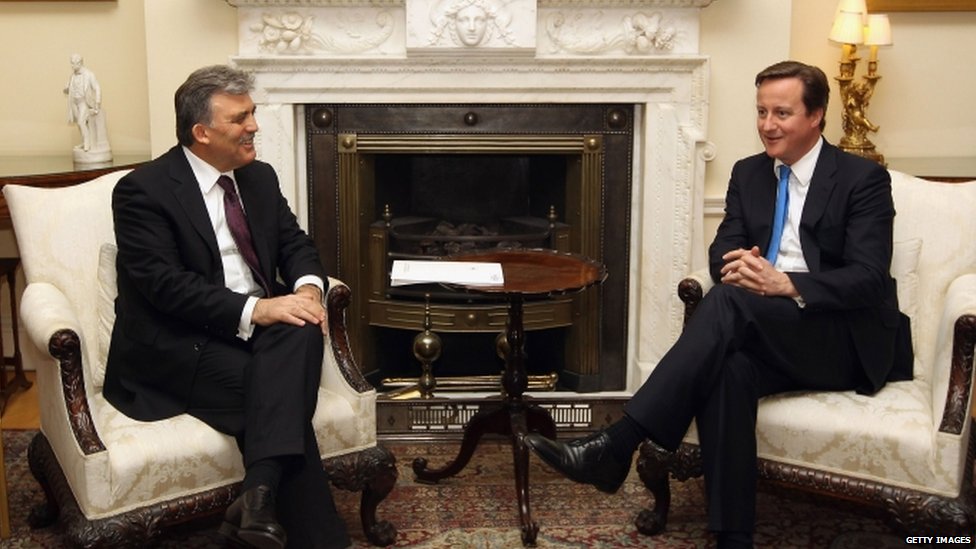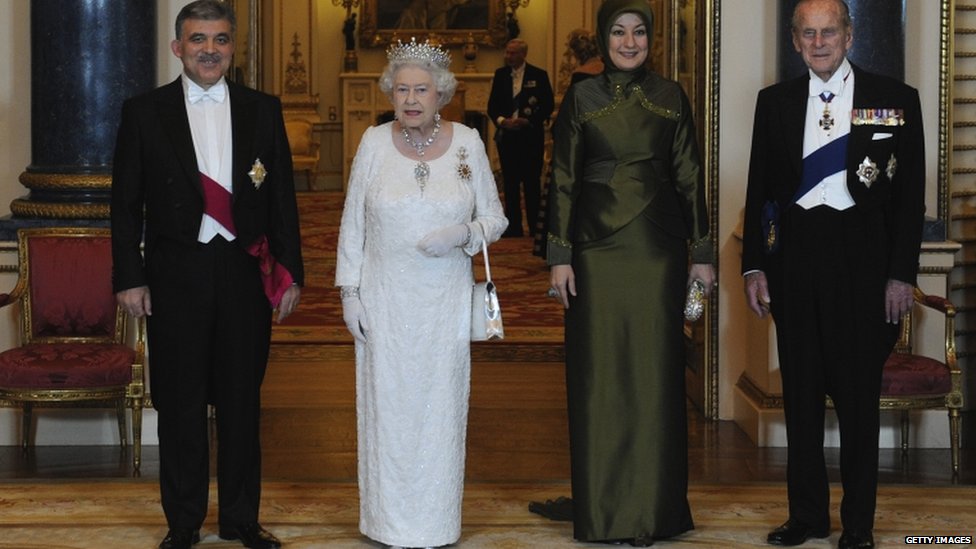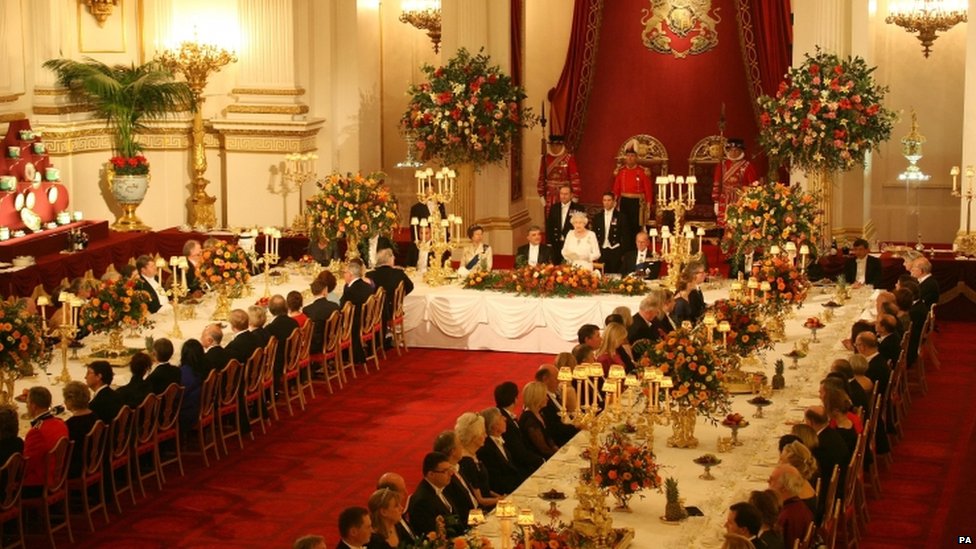How to install the app on iOS
Follow along with the video below to see how to install our site as a web app on your home screen.
Note: This feature may not be available in some browsers.
You are using an out of date browser. It may not display this or other websites correctly.
You should upgrade or use an alternative browser.
You should upgrade or use an alternative browser.
Queen welcomes Turkish President
- Thread starter RedBeard
- Start date
RedBeard
FULL MEMBER

- Joined
- Sep 5, 2011
- Messages
- 1,081
- Reaction score
- 0
Britain and Turkey: a new special relationship
The case for a strong bilateral partnership between Britain and Turkey has never been stronger, writes William Hague.

Abdullah Gul, Turkey's president, speaks at the CBI annual conference
Last year within three months of becoming Prime Minister, David Cameron arrived in Ankara. When asked "Why Turkey?" and, "Why so soon?" he said: because Turkey is vital for our economy, vital for our security and vital for our politics and our diplomacy.
Turkey is one of the world’s fastest growing economies. A young, energetic and entrepreneurial workforce – over half the population is under 29 years old – is an integral part of the success story. Analysts predict that Turkey will be one of the world’s top ten economies by 2050. As we recover from the current economic crisis, the case for a strong bilateral partnership between Britain and Turkey has never been stronger.
This week’s State Visit to the UK by Turkey’s President, Abdullah Gul, reminds us that Turkey is a country that is developing a new role and new links for itself, within and beyond existing structures and alliances. The UK and Turkey have a strong relationship across the range of foreign policy and security issues. Over the last 18 months we have laid firm foundations for that relationship through an ambitious Strategic Partnership which prompted the Turkish Prime Minister, Recep Tayyip Erdogan, to say that relations with the UK had entered a “golden age.” Indeed they have.
Since the Partnership was signed, we have established a UK-Turkey CEO Forum, composed of around 25 of the most senior business figures from our two countries to discuss the strategic issues that will deliver profitable business for the future. This week’s State Visit provides a platform for forging deeper commercial partnerships. By the end of this year, trade is expected to reach £9 billion, representing a 40% increase since 2009. British companies concerned about falling demand for their products should extend their reach now to Turkey. Many, such as Vodafone, Diageo and Tesco are already doing so.
Turkey is vital for our security: we work together as NATO allies across the world. In Afghanistan, we share the same objectives. Turkish troops and diplomacy are making vital contributions towards the creation of a more secure future, most recently with the valuable discussions at the Istanbul Conference on regional support for Afghanistan. Closer to home, in the Western Balkans we are working together to secure the gains made in the last 16 years to bring stability to the region
Our counter-terrorism experts met in London last week to discuss how we can strengthen cooperation in countering radicalisation and tackling the scourge of PKK terrorism. Turkey also shares our concerns on immigration. We have developed a number of joint projects to stem the flow of illegal migrants entering the EU from central and southern Asia.
Turkey’s important role in the Middle East and North Africa region is clear. Many of those who have taken to the streets during the Arab Spring for a more just, representative form of government have, in Turkey, a very successful example of modern democracy in a largely Muslim country. I’m struck by the contrast between the anxiety in some quarters about the EU's future role in the world, and the self-confident approach Turkey has taken in recent months to driving forward international collaboration on issues ranging from Afghanistan to Somalia. On Syria, Turkey has played an important role, pressing the regime to stop the violence and engaging with international partners, particularly the Arab League, to intensify wider pressure on Assad.
It’s clear that the UK and our fellow Member States in the EU will have to contend with rapid change and uncertainty in our neighbourhood, across north Africa to central Asia, in the coming years. Few countries are better placed to influence events in this vital region than Turkey. We already benefit from this. My Turkish counterpart, Ahmet Davutoglu, is making active and astute contributions on issues at the heart of the EU’s foreign policy agenda.
Since the launch of EU accession negotiations in 2005, Turkey has taken important strides towards meeting EU standards on human rights, democracy and governance. Turkey has abolished the death penalty, introduced a zero-tolerance approach to torture, improved rights for women and minority groups and, most recently, taken steps to compensate religious foundations. There is still some way to go, but the Turkish Government has committed itself to further progress through a new constitution that will meet the aspirations and demands of a modern democracy and truly represent the interests of all citizens of Turkey. And we want to encourage our Turkish friends to do even more.
And we want to send a message of a full support for energetic Turkish negotiations with the EU. It is deeply disappointing that these have been grindingly slow. If they continue with the same tempo the risk is that Turkish public opinion, traditionally in favour of entry into the EU, will turn against it and an historic opportunity will have been spurned. This is in no-one’s interest. I call on Turkey to keep its patience and determination to join the EU, and also on our EU partners to keeping working towards a goal that is in our common interests.
Economic uncertainty within the EU and political uncertainty on the continent’s southern and eastern borders should be pulling the EU and Turkey together, not pushing them apart. Turkish accession would bring fresh energy to the Single Market. Europe’s influence overseas needs the leverage that a successful democracy in a largely Muslim country would bring. Together, as I believe this week’s State Visit will demonstrate, the UK and Turkey can help chart a safe course through the current global political and economic storm.
Britain and Turkey: a new special relationship - Telegraph
The case for a strong bilateral partnership between Britain and Turkey has never been stronger, writes William Hague.

Abdullah Gul, Turkey's president, speaks at the CBI annual conference
Last year within three months of becoming Prime Minister, David Cameron arrived in Ankara. When asked "Why Turkey?" and, "Why so soon?" he said: because Turkey is vital for our economy, vital for our security and vital for our politics and our diplomacy.
Turkey is one of the world’s fastest growing economies. A young, energetic and entrepreneurial workforce – over half the population is under 29 years old – is an integral part of the success story. Analysts predict that Turkey will be one of the world’s top ten economies by 2050. As we recover from the current economic crisis, the case for a strong bilateral partnership between Britain and Turkey has never been stronger.
This week’s State Visit to the UK by Turkey’s President, Abdullah Gul, reminds us that Turkey is a country that is developing a new role and new links for itself, within and beyond existing structures and alliances. The UK and Turkey have a strong relationship across the range of foreign policy and security issues. Over the last 18 months we have laid firm foundations for that relationship through an ambitious Strategic Partnership which prompted the Turkish Prime Minister, Recep Tayyip Erdogan, to say that relations with the UK had entered a “golden age.” Indeed they have.
Since the Partnership was signed, we have established a UK-Turkey CEO Forum, composed of around 25 of the most senior business figures from our two countries to discuss the strategic issues that will deliver profitable business for the future. This week’s State Visit provides a platform for forging deeper commercial partnerships. By the end of this year, trade is expected to reach £9 billion, representing a 40% increase since 2009. British companies concerned about falling demand for their products should extend their reach now to Turkey. Many, such as Vodafone, Diageo and Tesco are already doing so.
Turkey is vital for our security: we work together as NATO allies across the world. In Afghanistan, we share the same objectives. Turkish troops and diplomacy are making vital contributions towards the creation of a more secure future, most recently with the valuable discussions at the Istanbul Conference on regional support for Afghanistan. Closer to home, in the Western Balkans we are working together to secure the gains made in the last 16 years to bring stability to the region
Our counter-terrorism experts met in London last week to discuss how we can strengthen cooperation in countering radicalisation and tackling the scourge of PKK terrorism. Turkey also shares our concerns on immigration. We have developed a number of joint projects to stem the flow of illegal migrants entering the EU from central and southern Asia.
Turkey’s important role in the Middle East and North Africa region is clear. Many of those who have taken to the streets during the Arab Spring for a more just, representative form of government have, in Turkey, a very successful example of modern democracy in a largely Muslim country. I’m struck by the contrast between the anxiety in some quarters about the EU's future role in the world, and the self-confident approach Turkey has taken in recent months to driving forward international collaboration on issues ranging from Afghanistan to Somalia. On Syria, Turkey has played an important role, pressing the regime to stop the violence and engaging with international partners, particularly the Arab League, to intensify wider pressure on Assad.
It’s clear that the UK and our fellow Member States in the EU will have to contend with rapid change and uncertainty in our neighbourhood, across north Africa to central Asia, in the coming years. Few countries are better placed to influence events in this vital region than Turkey. We already benefit from this. My Turkish counterpart, Ahmet Davutoglu, is making active and astute contributions on issues at the heart of the EU’s foreign policy agenda.
Since the launch of EU accession negotiations in 2005, Turkey has taken important strides towards meeting EU standards on human rights, democracy and governance. Turkey has abolished the death penalty, introduced a zero-tolerance approach to torture, improved rights for women and minority groups and, most recently, taken steps to compensate religious foundations. There is still some way to go, but the Turkish Government has committed itself to further progress through a new constitution that will meet the aspirations and demands of a modern democracy and truly represent the interests of all citizens of Turkey. And we want to encourage our Turkish friends to do even more.
And we want to send a message of a full support for energetic Turkish negotiations with the EU. It is deeply disappointing that these have been grindingly slow. If they continue with the same tempo the risk is that Turkish public opinion, traditionally in favour of entry into the EU, will turn against it and an historic opportunity will have been spurned. This is in no-one’s interest. I call on Turkey to keep its patience and determination to join the EU, and also on our EU partners to keeping working towards a goal that is in our common interests.
Economic uncertainty within the EU and political uncertainty on the continent’s southern and eastern borders should be pulling the EU and Turkey together, not pushing them apart. Turkish accession would bring fresh energy to the Single Market. Europe’s influence overseas needs the leverage that a successful democracy in a largely Muslim country would bring. Together, as I believe this week’s State Visit will demonstrate, the UK and Turkey can help chart a safe course through the current global political and economic storm.
Britain and Turkey: a new special relationship - Telegraph
RedBeard
FULL MEMBER

- Joined
- Sep 5, 2011
- Messages
- 1,081
- Reaction score
- 0
‘Half-country to lead miserable union,’ Gül tells EU
22 November 2011, Tuesday / EKREM DUMANLI, LONDON

President Gül and his wife visit with Queen Elizabeth II at an official ceremony held for the Turkish leader on Tuesday in London. (Photo: AA)
Greek Cyprus was made an EU member by violating all the standard procedures without seeing the process through to the end, meaning that now, when it takes over the EU's rotating presidency in July of next year, it will be a “half-country” leading a “miserable” union, President Abdullah Gül said on his official visit to London this week.Speaking to journalists from Turkey in London, where he is on an official visit, Gül said Turkey will protest Cyprus serving as president of the rotating EU in July 2012.
Gül noted that talks between the EU and Turkey have been stalled for a long time, saying that almost all of the negotiation chapters have been frozen and that there is little possibility to open any of them at this time. “We have said that this hurts the EU's reputation greatly. This might greatly discredit the EU starting in the first half of 2012. Can you imagine? The Greek Cypriot administration joined the EU, violating all the principles of the union, in a half-done manner, in an incomplete way. This was their first example of violating the principles of this family. And now, this half-country, this incomplete nation, will serve as EU president. You have such a union, but the presidency will be that of half a country. It will be half a country leading a miserable union,” Gül told Turkish journalists, using the word “miserable” in English, and adding that he has said the same words to EU officials.
Gül said Turkey would not participate in any meetings to be chaired by Cyprus but has no problems with continuing to work with the commission.
Visit to the UK
Gül also spoke about the details of his visit, saying that officials asked him questions about Syria in all of his meetings. “This also came at a time when an interview with Bashar al-Assad was published in the Sunday Times, so it was a hot topic in England. Naturally, when Syria's nearest neighbor is here, that was the first question they asked. We joined an editorial meeting at The Guardian; they asked the same thing there,” he said.
Gül said Turkey had no hidden agendas concerning Syria, stating: “We want security, economic stability and welfare. If there is enough wealth, everybody will take his share of that. This is all we want.”
He said it was impossible for a single-party state, or other oppressive form of government, to survive in this age. “The walls of fear have come down. This was what happened in Egypt, and what is happing in Syria. This is why we want this transitional process to be complete without damaging or weakening Syria, without causing any suffering to the people of Syria. We also think that foreign intervention is not the right way. We hope it won't reach such a point,” he explained.
The PKK and Europe
President Gül said the issue of the terrorist Kurdistan Workers' Party (PKK) also came up during his talks in the UK, noting: “I always say this openly, nothing can justify terrorism. Radical political ideas can be defended as long as there is no violence behind them, but the fight against those who use violence will continue until the end. Sometimes it's regional and sometimes international. We attach great importance to cooperation on this issue.”
Another question the president said was asked frequently was how Turkey was able to emerge from the global economic crisis almost unscathed. “We get this question a lot here, they ask, ‘Where does Turkey's strength come from?' Well it comes from the soft power it has earned. It has always had [a good] military. Our population was also this size before, but what really strengthened its economy was its soft power,” he answered.
Gül said it was important for Turkey to complete membership negotiations with the EU, adding that Turkey's soft power has also contributed to its relations with the EU. He said the EU process gave Turkey strength, stating that perhaps Turks, like the Norwegians, might vote against Turkish membership one day, but said the process should be completed first. “The negotiation process is making a huge contribution [to Turkey's progress]. This is why we should carry on with determination. The eurozone crisis is a problem for both EU members and countries outside the eurozone. That does not concern us; we do not have any intentions of joining the eurozone. That is when you really lose sovereignty,” he said.
In response to a question on whether he could have imagined, as a young student who came to London in 1976 to study, that one day he would meet the queen of England, Gül said, “I hear the queen was crowned when I was three.” He recalled that he also never thought he would be president one day, saying: “Fate brought me here, to such a position. Of course it is very exciting and a source of pride. We drove by the palace today; both sides of it were decorated with Turkish and British flags. This is an additional source of pride and certainly [enhances my sense of] responsibility. This tells me one thing: We do have inadequacies in our country, but the channels [to achieve] are there. As a child from a family from Kayseri, in Anatolia, I am the president of Turkey.”
He said his first experience abroad was his stay in London. “That's how I learned about the world. That was the first time I saw a black person. I saw the colorful world of Muslims in the big mosque at Regent's Park. I heard of different denominations here for the first time. And again it was in that time that I saw great struggles for freedom. The world has changed a lot,” the president reminisced.
Gül also said his two years as a student in London had contributed greatly to shaping his ideas of what a democracy should be like today.
Possible PKK threat in Syria
In response to a question on how Turkey would act in the face of a potential military threat from Syria, the president said: “We will prepare for every possible scenario. Our response will be very clear, in the event [of a military threat], even if it is from somewhere else.” He acknowledged that there was a risk of the PKK creating a second safe haven for its militants in Syria, similar to northern Iraq. “I am of the opinion that those in charge in Syria will not make such a mistake. We will never tolerate such a thing. We will not allow it to happen. The current administration in Syria knows that. I doubt they will allow something like that to happen,” he said.
http://www.todayszaman.com/news-263607-half-country-to-lead-miserable-union-gul-tells-eu.html
22 November 2011, Tuesday / EKREM DUMANLI, LONDON

President Gül and his wife visit with Queen Elizabeth II at an official ceremony held for the Turkish leader on Tuesday in London. (Photo: AA)
Greek Cyprus was made an EU member by violating all the standard procedures without seeing the process through to the end, meaning that now, when it takes over the EU's rotating presidency in July of next year, it will be a “half-country” leading a “miserable” union, President Abdullah Gül said on his official visit to London this week.Speaking to journalists from Turkey in London, where he is on an official visit, Gül said Turkey will protest Cyprus serving as president of the rotating EU in July 2012.
Gül noted that talks between the EU and Turkey have been stalled for a long time, saying that almost all of the negotiation chapters have been frozen and that there is little possibility to open any of them at this time. “We have said that this hurts the EU's reputation greatly. This might greatly discredit the EU starting in the first half of 2012. Can you imagine? The Greek Cypriot administration joined the EU, violating all the principles of the union, in a half-done manner, in an incomplete way. This was their first example of violating the principles of this family. And now, this half-country, this incomplete nation, will serve as EU president. You have such a union, but the presidency will be that of half a country. It will be half a country leading a miserable union,” Gül told Turkish journalists, using the word “miserable” in English, and adding that he has said the same words to EU officials.
Gül said Turkey would not participate in any meetings to be chaired by Cyprus but has no problems with continuing to work with the commission.
Visit to the UK
Gül also spoke about the details of his visit, saying that officials asked him questions about Syria in all of his meetings. “This also came at a time when an interview with Bashar al-Assad was published in the Sunday Times, so it was a hot topic in England. Naturally, when Syria's nearest neighbor is here, that was the first question they asked. We joined an editorial meeting at The Guardian; they asked the same thing there,” he said.
Gül said Turkey had no hidden agendas concerning Syria, stating: “We want security, economic stability and welfare. If there is enough wealth, everybody will take his share of that. This is all we want.”
He said it was impossible for a single-party state, or other oppressive form of government, to survive in this age. “The walls of fear have come down. This was what happened in Egypt, and what is happing in Syria. This is why we want this transitional process to be complete without damaging or weakening Syria, without causing any suffering to the people of Syria. We also think that foreign intervention is not the right way. We hope it won't reach such a point,” he explained.
The PKK and Europe
President Gül said the issue of the terrorist Kurdistan Workers' Party (PKK) also came up during his talks in the UK, noting: “I always say this openly, nothing can justify terrorism. Radical political ideas can be defended as long as there is no violence behind them, but the fight against those who use violence will continue until the end. Sometimes it's regional and sometimes international. We attach great importance to cooperation on this issue.”
Another question the president said was asked frequently was how Turkey was able to emerge from the global economic crisis almost unscathed. “We get this question a lot here, they ask, ‘Where does Turkey's strength come from?' Well it comes from the soft power it has earned. It has always had [a good] military. Our population was also this size before, but what really strengthened its economy was its soft power,” he answered.
Gül said it was important for Turkey to complete membership negotiations with the EU, adding that Turkey's soft power has also contributed to its relations with the EU. He said the EU process gave Turkey strength, stating that perhaps Turks, like the Norwegians, might vote against Turkish membership one day, but said the process should be completed first. “The negotiation process is making a huge contribution [to Turkey's progress]. This is why we should carry on with determination. The eurozone crisis is a problem for both EU members and countries outside the eurozone. That does not concern us; we do not have any intentions of joining the eurozone. That is when you really lose sovereignty,” he said.
In response to a question on whether he could have imagined, as a young student who came to London in 1976 to study, that one day he would meet the queen of England, Gül said, “I hear the queen was crowned when I was three.” He recalled that he also never thought he would be president one day, saying: “Fate brought me here, to such a position. Of course it is very exciting and a source of pride. We drove by the palace today; both sides of it were decorated with Turkish and British flags. This is an additional source of pride and certainly [enhances my sense of] responsibility. This tells me one thing: We do have inadequacies in our country, but the channels [to achieve] are there. As a child from a family from Kayseri, in Anatolia, I am the president of Turkey.”
He said his first experience abroad was his stay in London. “That's how I learned about the world. That was the first time I saw a black person. I saw the colorful world of Muslims in the big mosque at Regent's Park. I heard of different denominations here for the first time. And again it was in that time that I saw great struggles for freedom. The world has changed a lot,” the president reminisced.
Gül also said his two years as a student in London had contributed greatly to shaping his ideas of what a democracy should be like today.
Possible PKK threat in Syria
In response to a question on how Turkey would act in the face of a potential military threat from Syria, the president said: “We will prepare for every possible scenario. Our response will be very clear, in the event [of a military threat], even if it is from somewhere else.” He acknowledged that there was a risk of the PKK creating a second safe haven for its militants in Syria, similar to northern Iraq. “I am of the opinion that those in charge in Syria will not make such a mistake. We will never tolerate such a thing. We will not allow it to happen. The current administration in Syria knows that. I doubt they will allow something like that to happen,” he said.
http://www.todayszaman.com/news-263607-half-country-to-lead-miserable-union-gul-tells-eu.html
The Queen made a state visit to Turkey in 2008. Britain supported Turkey's right to became an official candidate for EU membership and formal accession negotiations began in 2005. 
At least, Turkey should try to make efforts for Pakistan to join EU membership, just kidding!

At least, Turkey should try to make efforts for Pakistan to join EU membership, just kidding!

Azatavrear
FULL MEMBER

- Joined
- Aug 17, 2010
- Messages
- 384
- Reaction score
- 0
I am suprised Gul hasn't been Knighted yet by the Queen.
Pakistanisage
PROFESSIONAL

- Joined
- Jul 29, 2011
- Messages
- 9,450
- Reaction score
- 18
- Country
- Location
Why was Queen not wearing a Hijab ?
Why was Queen not wearing a Hijab ?
Because the Queen was not on a tour to Saudi Arabia.
American Pakistani
ELITE MEMBER

- Joined
- May 30, 2010
- Messages
- 15,374
- Reaction score
- 10
- Country
- Location
Good to see.
UK is the country that i loves more than any other in that west.
UK is the country that i loves more than any other in that west.
Cerian
FULL MEMBER

- Joined
- Jul 30, 2010
- Messages
- 375
- Reaction score
- 0
Thats one way of looking at it. I'll say, even in Libya, Turkey is trying to act together with its neighbors, more specifically, Arab League.Hmm ... Turkey has lately been on the same page as NATO with regard to Libya and now Syria.
Zulkarneyn
BANNED

- Joined
- Dec 7, 2010
- Messages
- 2,633
- Reaction score
- 5
- Country
- Location
I am suprised Gul hasn't been Knighted yet by the Queen.
He has actually received Honorary Knight Grand Cross of the Civil Division of the Most Honourable Order of the Bath in 2008 ^^
Abdullah Gül - Wikipedia, the free encyclopedia
Similar threads
- Replies
- 0
- Views
- 961
- Replies
- 1
- Views
- 337
- Replies
- 16
- Views
- 741
- Replies
- 36
- Views
- 2K
- Replies
- 37
- Views
- 2K
Latest posts
-
-
-
Argentina Considering To Purchase 12 JF17C Worth 664Million Dollars
- Latest: FourMikeEcho
-
-
Pakistan Affairs Latest Posts
-
Pakistan military officer sues Adil Raja for defamation in unprecedented UK action
- Latest: muhammadhafeezmalik
-

